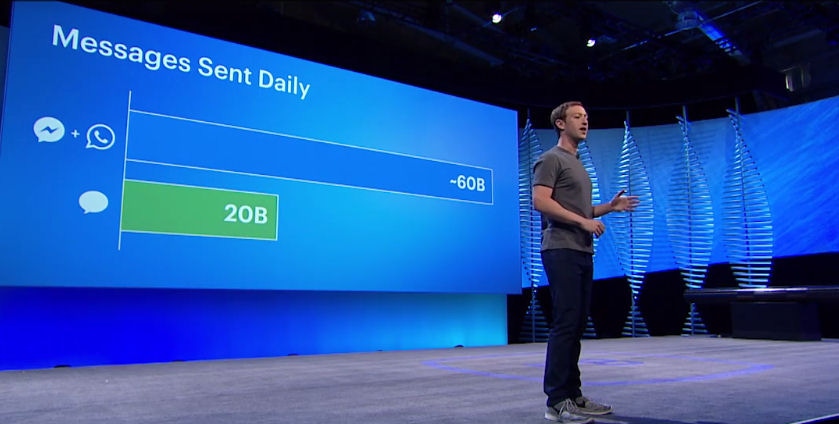Social media giant Facebook kicked-off its f8 developer conference with a major messaging push as well as a renewed focus on virtual reality.
April 13, 2016

Social media giant Facebook kicked-off its f8 developer conference with a major messaging push as well as a renewed focus on virtual reality.
The big launch was Messenger Platform, which aims to make it easier for the claimed 900 million worldwide monthly Facebook Messenger users to communicate directly with businesses, which will presumably pay Facebook for the facility.
To illustrate the potential of Messenger, after stressing the societal importance of communication in a monologue reminiscent of the 1990 Bob Hoskins BT ads, Facebook CEO Mark Zuckerberg highlighted the statistic that Messenger and Facebook-owned WhatsApp between them (he didn’t reveal the split) process around 60 billion messages daily, three times more than the 20 billion level he said was SMS at its peak.
The clever bit of Messenger platform seems to involve the use of artificial intelligence to automate the customer interaction for businesses via ‘bots’. We tried it out for a US clothing site called Spring and had a conversation with a bot involving a series of questions that arrived at the conclusion that we were looking for men’s tops under $75. “Awesome, thanks!” effused the bot, adding “Here are five items we think you’ll dig.” Five men’s tops costing less than $75 were then presented via Messenger.
The experience was fairly linear and limited, with a straw poll of female colleagues revealing it has little in common with their typical clothes browsing experience. Additionally the supposed AI consisted of little more than a rudimentary questionnaire, so in its current state it doesn’t seem to be a satisfactory alternative to talking to a human being. However, as a first point of contact for businesses it may prove a powerful tool and those 900 million consumers are hard to overlook.
The other headline launch was a reference design of a 17-camera 360 degree video capture device, which Facebook hopes will catalyse the use of virtual reality for sharing, interacting, gaming, etc. They also gave a Samsung Gear VR set as well as a Samsung smartphone to every attending developer.
A recent report from Strategy Analytics identified 2016 as a pivotal year for VR, with smartphone-based sets such as the Gear serving as a ‘gateway drug’ to more premium experiences from the likes of HTC, Sony and Oculus. SA reckons the overall VR headset market will hit $895 million this year.
“Consumers will soon be exposed to an incredible diversity of virtual reality options ranging from ultra-low cost to super premium,” said SA’s Cliff Raskind. “While we expect smartphone-based viewers to take the lion’s share of VR headset volumes in 2016 at 87% of shipments, PC and game console powered headsets will absolutely dominate value share commanding 77% of revenues.”
The premium VR headset market remains a pretty high risk one, however, as it’s still at an early stage and the headsets aren’t cheap. Oculus is reportedly experiencing significant shipping delays, while Sony and HTC can’t afford to wait too long for a return on their investment. It wouldn’t be surprising to see Facebook make some substantial investments in this sector before long.
About the Author(s)
You May Also Like








.png?width=300&auto=webp&quality=80&disable=upscale)


_1.jpg?width=300&auto=webp&quality=80&disable=upscale)


.png?width=800&auto=webp&quality=80&disable=upscale)